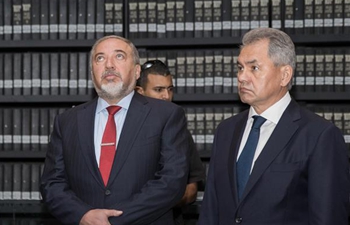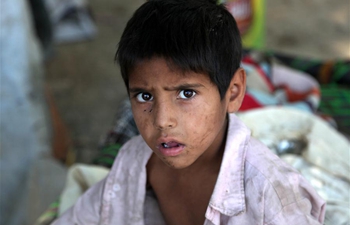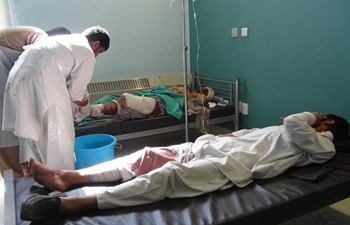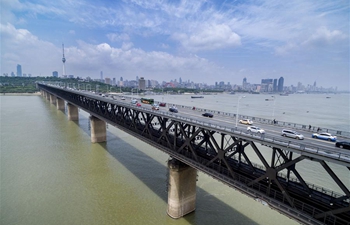by Osama Radi, Omar Othmani
GAZA, Oct. 18 (Xinhua) -- Palestinian fisherman Talat Baker from Gaza City showed little enthusiasm when hearing earlier the week the news that Israel decided to temporarily expand the fishing zone for Gaza fishermen.
An Israeli army spokesman announced earlier this week that the Israeli army decided to expand the fishing area off the Gaza Strip from six nautical miles (11 km) to nine nautical miles for two months.
However, the announcement was not warmly accepted by Gaza's fishermen like Baker, who said it is far from enough to ease the restrictions imposed on them to improve their plight.
"They (Israelis) are deceiving us," Baker, in his late 50s and has been working as a fisherman for around 40 years, jeered the Israeli move.
The Israeli decision is limited in both scope and impact, Baker insisted. "It's off-shore from central Gaza Strip to the southernmost part of the coastal enclave close to Egypt," he said.
He explained that most of the area mentioned above "is rocky and therefore does not breed fish. It also threatens to damage the fishing nets, the thing which makes the outcome of the decision limited on fishermen and their production of fish in the Gaza Strip."
Husam al-Hissi, another fisherman, agreed with what Baker said. He said the allowed area for fishing is limited, not to mention that the Israeli decision came with tight restrictions.
There are about 3,800 fishermen working on more than 700 boats in Gaza Strip, where 70,000 Palestinians are making a living out of fishing, said Hisham Baker, chairman of the Fishing Association in Gaza.
For Gaza fisherman, Israel should at least expand the fishing zone to 12 nautical miles so to increase their fishing production.
Al-Hissi, who sells the fish in the famous "Hesba" fish market in Gaza, said he wished he can double his working hours to cover his family's expenses, but the current zone demarcated by Israel is not enough.
"We feel that we are in a large prison and face great difficulties in our work, and only allowing us to sail for more than 12 miles is what will save us overcoming our difficult conditions and the limited production of fish," said al-Hissi.
He added that lifting Israeli restrictions "would increase our production of fish and reduce the prices of fish" so more Palestinians in Gaza can afford to eat fish.
"Gaza fishermen are facing great difficulties, mainly the reduction of the number of working hours due to the Israeli naval blockade imposed on the sea and also being targeted and harassed on daily bases," al-Hissi said.
The tight security measures imposed by Israeli Navy have also created difficulties and even risks for Palestinian fishermen.
Al-Hissi said Israeli Navy, usually under the name of fighting smuggling of arms, has arrested more than 70 Palestinian fishermen and seized more than 40 fishing boats off the coast of the Gaza Strip since the beginning of the year.
Baker also said that the fishermen in Gaza "suffer from extremely difficult economic conditions and extreme poverty because of the Israeli restrictions imposed on their work."
He added "the only way to change that is to allow them to sail beyond 12 nautical miles."
Under the Oslo peace agreement, signed between Israel and Palestine Liberation Organization in 1993, stipulates that Palestinian fishermen are allowed to fish in an area of 20 nautical miles (37 km).
But Israeli Navy has reduced the fishing zone down to six miles, and sometimes to only three miles offshore, after Israel imposed a tight blockade on the enclave after the Islamic Hamas movement seized control of Gaza in 2007.
The Israeli blockade has led to a serious problem of unemployment, at record high of 42 percent among Gaza Strip's population of about 2 million.
Rights groups have already warned that thousands of Palestinian families in Gaza are reaching the record low level of poverty and relying on humanitarian aid.
They also face unprecedented shortage of food, with 80 percent food insecurity due to the ongoing Israeli blockade.

















